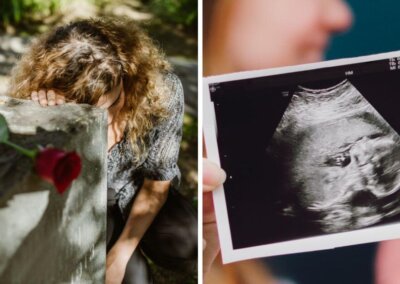Babies who die before 24 weeks gestation are not legally recognised in Wales but campaigners are fighting to change the law.
In England in July last year, the Government announced that it would be introducing pregnancy loss certificates for women who lose their babies before 24 weeks gestation. Previously, if a woman lost her baby before 24 weeks, it was registered as a miscarriage. Only if she lost her baby after 24 weeks gestation was the death recorded as a stillbirth.
However, the introduction of a pregnancy loss certificate only applied in England. This meant that when Elan Arfor Connor lost her son, Elis, at 22 weeks gestation, she had to fight to have her son’s death recognised.
Elis was born alive but died minutes later
His mum said “After that I was given the option to leave the hospital or stay in a bereavement room overnight and I stayed with him the entire night. He was put into a cold cot”.
“It was traumatic to have to go through labour and try to emotionally prepare for the fact you’re going to give birth and you don’t know if your son is going to be alive or not”.
“Nothing prepares you for the feeling of having to hold your son after giving birth and watching him die in your arms. It was the most traumatic thing I’ve ever been through”.
Elan was told that her son was not entitled to have his death legally recognised because she lost him before 24 weeks.
“I had videos and pictures to prove he was alive when he was born”, Elan said.
“The midwife came back and asked if this is something I’m sure I’d want to go through and if it would make me feel any better”.
“I said ‘I’m very happy to go all the way because I know what I saw’. I pushed and pushed for [a legal recognition of his death]”.
Elan did manage to receive legal recognition and said it helped with the grieving process but said “It was horrible having to fight for that. When you’re trying to grieve and manage everything and contact all these people, you feel really alone and like you’re fighting with a wall”.
“For me, because I couldn’t bring my son into the world the way I wanted to, it felt like it was something I needed to do for him and me”.
“He was very much real and I needed that certificate to prove that he was here and he existed in this world.”
Certificates “help to legitimise people’s grief”
Baby loss campaign lead at the Fair Treatment for the Women of Wales charity, Jessica Evans, said the current situation was a “postcode lottery”.
“Ultimately I think the certificates will help to legitimise people’s grief and help to process their grief”, she added.
The Welsh government said “All families who experience pregnancy loss at maternity units in Wales are supported by bereavement midwives… and offered memory boxes which include a certificate of birth.”
Right To Life UK spokesperson Catherine Robinson said “Pregnancy loss at any stage of pregnancy for any reason is a tragedy. Every baby who dies, whether in the womb or after birth, is someone’s son or daughter and ought to be recognised as having existed and having mattered.”












